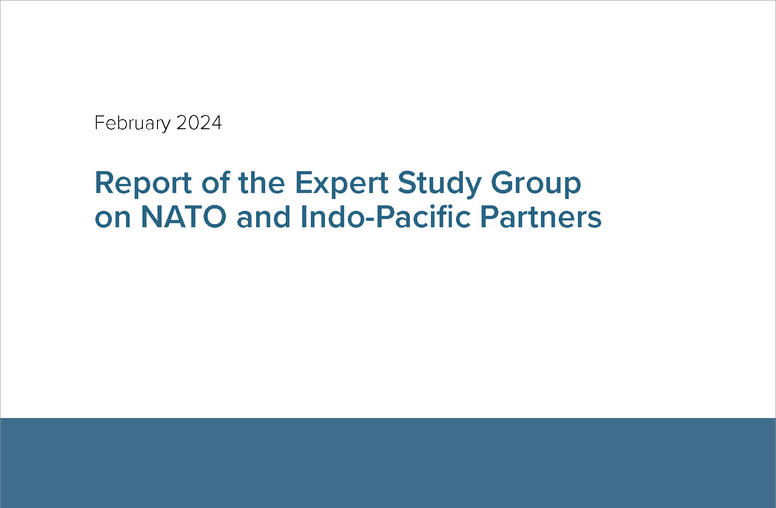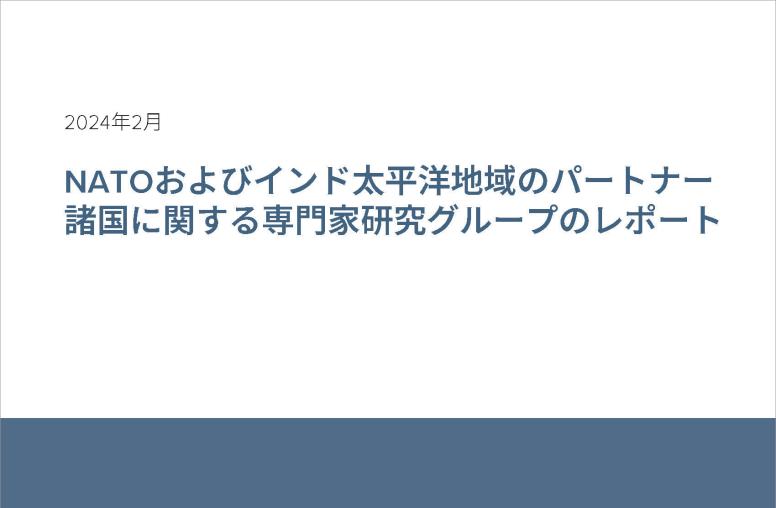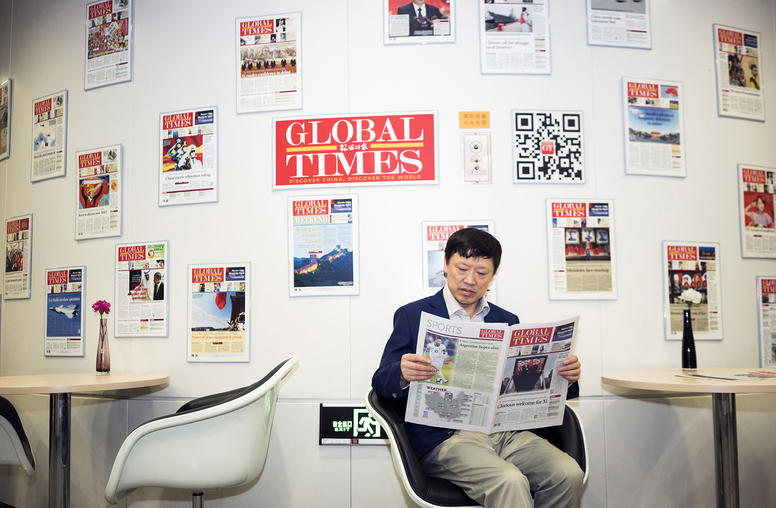To understand the implications of these changes for U.S. national security interests, USIP convened a study group of experts from the United States and other NATO countries and from NATO’s formal partners in the Indo-Pacific: Australia, Japan, South Korea and New Zealand, which are informally known as the Indo-Pacific Four (IP4). The group shed light on the perspectives, interests and concerns of Indo-Pacific partners on security engagement with Europe, Europe’s role vis-à-vis security challenges from China, the impacts of the war in Ukraine on the Indo-Pacific, and areas for cooperation between NATO and the IP4, which support U.S. national interests in both the Indo-Pacific and Europe.

Expert Study Group on NATO and Indo-Pacific Partners
Mirna Galic, Chair
Mirna Galic is a senior policy analyst for China and East Asia at the United States Institute of Peace. She is also a nonresident senior fellow at the Japan Institute of International Affairs. She previously served as a senior advisor with the U.S. government at both the Department of State and in the Senate and as a special advisor in the Office of the Secretary-General at the United Nations.
Joe Burton
Joe Burton is professor of International Security, Politics, Philosophy, and Religion at Lancaster University. He previously held positions at the University of Nottingham and the University of St Andrews and was a Marie Curie (MSCA-IF) research fellow at Université libre de Bruxelles (ULB) working on the two-year European Commission funded project CYBERCULT: Strategic Cultures of Cyber Warfare. He has also served as a senior lecturer in the New Zealand Institute for Security and Crime Science (NZISCS) at the University of Waikato. Joe has published widely on NATO’s changing role in the post-Cold War period and was an expert in the NATO Science for Peace and Security (SPS) project, Global Perceptions of NATO (2014-2017).
David Capie
David Capie is director of the Centre for Strategic Studies and professor of international relations at Victoria University of Wellington. His research interests focus on conflict and security issues, particularly in the Indo–Pacific region, and New Zealand's foreign and defense policy. David has held visiting positions at the Weatherhead Center for International Affairs at Harvard University and at LUIS Guido Carli in Rome. He is a member of the Ministerial Advisory Panel for New Zealand’s Defense Policy Review.
Stephan Frühling
Stephan Frühling is a professor at the Strategic and Defense Studies Centre of the Australian National University. He was a Fulbright professional fellow in Australia-U.S. alliance studies at Georgetown University, research fellow in the research division of the NATO Defense College in Rome, and member of the Australian government’s external panel of experts on the 2016 Defence White Paper. His areas of expertise include Australian defense policy, defense planning, nuclear weapons and NATO.
Gorana Grgić
Gorana Grgić is a senior researcher at the Center for Security Studies at ETH Zürich and a senior lecturer at the United States Studies Centre at the University of Sydney. She is also the 2022-2023 research fellow in grand strategy at the Hertie School’s Centre for International Security in Berlin. In recent years, Grgić was a visiting fellow at the Harvard Center for European Studies (2018-2019) and a Partners Across the Globe research fellow at the NATO Defense College in Rome (2021). Grgić’s research interests include U.S. foreign policy, transatlantic relations, conflict resolution and democratization. Grgić’s research projects and teaching activities have been funded by the EU, NATO and the Australian Department of Defense.
Yoko Iwama
Yoko Iwama is professor and director of the Strategic Studies Program at the National Graduate Institute for Policy Studies in Tokyo, where she has been since 2000. Her current research interests include the origins and evolution of the nuclear-sharing and nuclear-consultation system in NATO and its relationship with the Nuclear Non-proliferation Treaty.
Kwang-Jin Kim
Kwang-Jin Kim is a retired brigadier general in the Korean Air Force and a chair professor at Sookmyung Women’s University in Seoul. He is concurrently a consultant board member at ROK Joint Chiefs of Staff (JCS). During his time on active duty, General Kim served in various roles, including as president of Air University and deputy director of Countering WMD Center at JCS. General Kim is the author of several books, including "The Stages of the Development and the Termination of Wars between States." He holds a Ph.D. in political science from University of Missouri.
Geunwook Lee
Geunwook Lee is a professor of political science at Sogang University in Seoul. He is concurrently on advisory boards for the Korean Ministry of Defense, Ministry of Foreign Affairs and Joint Chiefs of Staff. His areas of expertise include international relations and foreign and security policy, especially in the Indo-Pacific.
Jonathan Berkshire Miller
Jonathan Berkshire Miller is an international affairs professional with expertise on security, defense and geo-economic issues in the Indo-Pacific. He is currently a senior fellow with the Japan Institute of International Affairs, director and senior fellow of the Foreign Affairs, National Security and Defense program at the Macdonald Laurier Institute, senior fellow on East Asia for Asian Forum Japan, and the director and co-founder of the Council on International Policy. His areas of expertise include alliances policy and foreign and defense policy, especially in the Indo-Pacific.
Philip Shetler-Jones
Philip Shetler-Jones is a senior research fellow for Indo-Pacific security in the international security team at the Royal United Services Institute. He has previously worked at Chatham House as a consulting fellow on Indo-Pacific security and led the international security program at the World Economic Forum. He has also worked on planning and analysis for international organizations including the United Nations, the European Union, and the OSCE. His areas of expertise include European and Asian security.
Luis Simón
Luis Simón is director of the Centre for Security, Diplomacy and Strategy (CSDS) at the Brussels School of Governance. He is concurrently the director of the Brussels Office of the Elcano Royal Institute and a senior associate (non-resident) at the Europe program of the Center for Strategic and International Studies (CSIS). His areas of expertise include U.S. foreign and defense policy, transatlantic relations, European security, U.S.-China strategic competition and Asian security.
Michito Tsuruoka
Michito Tsuruoka is an associate professor in the faculty of policy management at Keio University, Japan. He is concurrently a visiting fellow at the Strategic and Defence Studies Centre of the Australian National University and a senior fellow at the Centre for Security, Diplomacy and Strategy at the Brussels School of Governance. Prior to joining Keio in 2017, he was a senior research fellow at the National Institute of Defense Studies, Ministry of Defense. He also served as an advisor for NATO at the Embassy of Japan in Belgium. Tsuruoka received his Ph.D. from King's College London and his areas of expertise include international security, contemporary European politics, Europe-Japan/Asia relations, and Japan’s foreign, security and defense policy.

Report of the Expert Study Group on NATO and Indo-Pacific Partners
USIP gathered the findings from a series of study group discussions into a report aimed at helping U.S., NATO and Indo-Pacific policymakers maximize the benefits and understanding the limitations of cooperation as the United States and its allies and partners work to adjust to geostrategic changes.

NATOおよびインド太平洋地域のパートナー諸国に関する専門家研究グループのレポート
United States Institute of PeaceはNATO諸国と、インド太平洋における同盟のパートナーであるオーストラリア、日本、ニュージーランド、そして韓国の専門家から構成された研究グループを招集しました。このグループでは、NATOに対するインド太平洋地域のパートナーの考え方や、NATOとインド太平洋地域のパートナーの関係における機会と課題について探求しました。
Related Analysis and Events

Amid a Changing Global Order, NATO Looks East
As NATO celebrates its 75th anniversary this year, the Euro-Atlantic security alliance continues to deepen its engagement with Australia, Japan, South Korea and New Zealand, collectively known as the IP4. NATO has collaborated with these countries since the early 2000s, but Russia’s war against Ukraine, security challenges posed by China and renewed strategic competition have led to increased engagement. As the war in Ukraine grinds on and U.S.-China competition shows no sign of abating, the United States has much to gain from collaboration between its allies and partners in the Euro-Atlantic and Indo-Pacific.

The Road to Washington’s NATO Summit
USIP hosted a discussion on NATO’s relations with its Indo-Pacific partners ahead of the July 2024 summit and the benefits and interests that have led the United States to support the development of these partnerships over time.

“Sewage of the Cold War”: China’s Expanding Narratives on NATO
Although China’s views on NATO have fluctuated since the early days of the Cold War, Beijing’s recent statements on the alliance have sharpened. This report argues that they amount to a “rhetorical attack” on the alliance’s legitimacy that can potentially undermine trust among its Asia-Pacific partners and, more broadly, confidence in Western ideas of collective security. The report offers recommendations for investments NATO should make in understanding, tracking, and countering Chinese narratives about the alliance.

The ‘Russia Factor’ in NATO-Japan Relations
Russia’s illegal and unprovoked aggression against Ukraine has changed Japan’s assessment of Russia, as well as Tokyo’s policy toward Moscow. In doing so, it has also brought NATO and Japan closer together in their views of Russia and led to broader NATO-Japan engagement. Whereas Russia was once a complicating factor in the NATO-Japan relationship, it is now a factor promoting relations.

New Zealand Draws Closer to NATO with a Wary Eye
Until recently, if New Zealanders thought about their country’s links to NATO, it was likely the two-decade long deployment to Afghanistan that came to mind. But if there might have been some sense those ties lay in the past, Russia’s brutal invasion of Ukraine in February 2022 has brought them squarely back to public attention. New Zealand’s links as a non-member partner of NATO have been central to its response to the war, including channeling aid to Kyiv.

The Growing Importance of NATO’s Indo-Pacific Partners
On July 11, USIP hosted a conversation with representatives of Australia, Japan, New Zealand and the Republic of Korea on such challenges and where NATO-partner relations fit in. The discussion provided insights into deepening relations with the alliance and cooperation between the Indo-Pacific and Euro-Atlantic to support security, resilience and the rules-based international order.